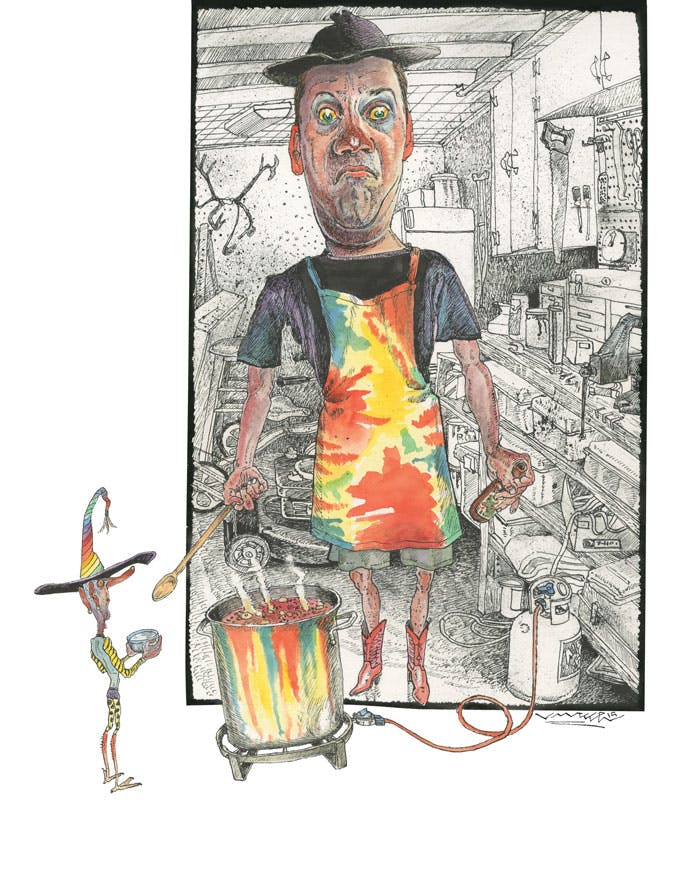
Q: This past summer my teenage daughter and her friend tie-dyed some T-shirts in our garage, and now my husband has found me “complicit” in the “desecration” of his beloved chili pot, which he recently discovered had a remnant of dye in it. I fear that our 24-year-long relationship has been irreparably damaged. How can I make this right?
Name Withheld, San Antonio
A: The Texanist cooks his chili in the very same pot from which the meaty stew of his youth was long ago ladled. This prized vessel was handed down to him by his father, a fine man and pretty fair chili chef. Every time the Texanist cooks chili, he thinks of his dad. The pot is special to him. Thus, the Texanist can understand your husband’s three-alarm disappointment as a result of the freaky goings-on in his own cherished pot. But the Texanist is also the father of a daughter who is prone to occasional mishaps, mostly of an innocent nature so far. By the Texanist’s estimation, your husband, depending on the exact age of your girl, is somewhere between thirteen and eighteen years late in realizing that once a child enters the picture, few treasured personal items will, for one reason or another, retain their sacred status. That failed diaper that permanently stained the couch in his man cave and the sippy cup full of chocolate milk that was allowed to leak its entire contents down the crack of his truck’s backseat only to be discovered a week later should have been the first of many clues. Since your husband’s pot was not rendered inoperable by the tie-dying or really even all that desecrated, the Texanist finds you not guilty of complicity. But to help with the thawing of the chilliness between you and Mr. Name Withheld caused by this misadventure, simply wash the pot thoroughly and then have your husband reconsecrate it to its former perceived glory with a big batch of his “famous” Texas red.
Q: I never cease to be amazed at the interesting and unusual things that grace our highways. On a stretch of Texas Highway 39, west of Hunt, there is a string of fence posts with a single boot secured to each one. It’s known as Boot Hill, even though there’s really no hill. Surely there is no other state with such an interesting collection of inverted footwear. Where did all these boots come from?
Ben Sanders, Houston
A: Rural Texans are known to put all sorts of mementos out on the fence for the pleasure of gandering passersby. Huge catfish heads, large rattlesnakes, and trophy coyote carcasses are fairly common sights on the fences of our hinterlands. The boot fence outside Hunt is a fine example of just this sort of display. The Texanist is familiar with the landmark, as it serves as a signal to him that the good times about to be had at Crider’s Rodeo and Dancehall are imminent—and about three miles back the other way on 39. The fence’s origins date to the early seventies, when a Kerr County family began putting the worn-out boots of the half dozen young buckaroos with whom they had been blessed up on the fence posts of their friend and neighbor, John Jobes. Soon the old boots of Jobes’s two young daughters went up. Then Jobes’s ranch hands put their boots up on the fence. In time, the posts became the final resting spot for most anybody’s old boots. Nowadays, this stretch of fence adorned with old boots is quite lengthy and has even jumped to the other side of the road. But contrary to your belief that this display is solely a Texas thing, the Texanist knows of at least two non-Texan footwear-adorned fences, one on a country road between Placerville and Coloma, out in California, and another in Glenwood, Minnesota. And then, of course, there’s the Cardrona Bra Fence, in Otago, New Zealand, another example of an eye-catching non-Texan roadside attraction.
Q: I am a native Texan, having been born and raised in Harlingen. I have, however, lived in the northern suburbs of Chicago for the past forty years. About once every two weeks or so, I will hear the word “pecan” mispronounced—usually at a Panera or a pie shop—especially around the holidays. This really grates on my nerves. Should I correct the person in question as politely as possible or let him or her continue down the path of ignorance?
Randy Casey, Libertyville, Illinois
A: “Pecan” (or, alternatively, “pee-kahn” or “pee-can”) is one of those words whose correct pronunciation is hotly contested. Whether the arguer’s allegiance is to “pecan” or, alternatively, “pee-kahn” or “pee-can” is almost always dictated by the regional dialect of the particular area from whence they came. Texas is decidedly “pecan” territory, while much of the East Coast goes with “pee-can” and most of the rest of the country is made up with “pee-kahn” people. Sometimes there are anomalies related to the origin of a person’s parents. For instance, there might be a native of Maine who goes with “pecan” because his Texas-raised mother pronounced it that way, while his fellow Mainiacs say “pee-can.” Since you are likely a “pecan”-er currently residing in pretty deep “pee-kahn” territory, the Texanist is wondering if you’ve ever been corrected. If so, you know very well that all such attempts are completely futile, as one must first acknowledge an error in one’s ways before an adjustment can be made, which is highly unlikely.
Q: My father-in-law gets way too into my son’s peewee football games, going so far as to cuss from the sidelines when he is upset with the outcome of a play or a referee’s call. So far he’s only received strange looks from the other parents, but I’m afraid he’s going to get into trouble with the officials or cause a fight or something. I’ve tried to talk to him about it, but he acts like nothing’s wrong.
Susan P., Lufkin
A: If one were to jot down a list of things that folks here in Texas can be excessively passionate about, football would be found right up there alongside state pride, state cuisines (and the pots in which they are prepared), and maybe even states’ rights. And the Texanist doesn’t have to tell you, a football mom, about the palpable excitement generated when two teams clash, gladiator-style, out on the gridiron. Whether the warriors in these pitched battles are 17-year-old high schoolers facing off on Friday night or 27-year-old professionals going at it on Sunday afternoon or 7-year-olds meeting at seven-thirty on a Saturday morning when normal people are sipping coffee and looking at the newspaper, or prepping for a fun trek to a nearby state park, or, ahem, sleeping off the previous night’s revelry, it matters not. Football is a great spectator sport. Until the spectating is tainted by a discourteous and unruly fan, that is. The Texanist applauds your father-in-law’s football enthusiasm and bets that beneath his unvarnished exterior he’s probably a good granddad on the inside. But it sounds as if his pigskin avidity is crossing over to an unacceptable rabidity, which if left unaddressed has the potential to spoil what ought to be a splendid outing for everyone in attendance. You or your husband needs to tell him that the Texanist says to dial it down a notch. Then back that warning up with the threat of a family-imposed ejection or, perhaps, a season-long ban. It would be best that he hear it from one of you instead of a league official, a cop, or worse, the angry (and sleepy) mom of the opposing team’s nose guard.
The Texanist’s Little-Known Fact of the Month: Of the more than 50,000 physicians currently registered with the Texas Medical Board, there are but a mere six with the surname Pepper. Set an appointment with any one of them for any time other than ten, two, or four o’clock.








